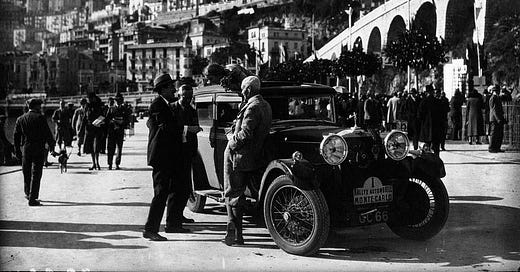Summary: This is where the story really kicks in. The following chapters are the ones in which the central dynamic is defined, and the suspense builds.
Chapter Three
Chapter Three of Rebecca brings us to Monte Carlo, where our 21-year-old Narrator is in the employ of Mrs. Van Hopper, a wealthy and domineering American woman, and aspiring socialite. Ghastly in every sense, from her coarse and gossipy approach, to her habit of extinguishing cigarettes in almost anything within reach (from hand cream to butter), Van Hopper is a social climber who can’t seem to find her footing.
“I wonder what my life would be to-day, if Mrs. Van Hopper had not been a snob. Funny to think that the course of my existence hung like a thread upon that quality of hers.”
The Narrator serves as a ‘companion’ to Van Hopper, which seems to consist of running errands and enticing people into her employer’s conversation (“Like a juggler’s assistant I produced the props, then silent and attentive I waited on my cue.”). As part of one of these tasks, she is instructed to garner the attention of Mr. Maxim De Winter. It is here where we learn that he is the owner of Manderley.
He flips the script on Van Hopper almost instantly, and she soon proves to be no match for his acerbic and wry sense of humour. Several comments go right over her head, but are certainly noticed by the Narrator, with whom Mr. De Winter seems quite taken (Van Hopper, being incredibly self-obsessed, seems to miss this aspect as well). Van Hopper continues to show herself up at every conversational opportunity, displaying a lack of tact and decorum which, thankfully, seems to amuse De Winter, as opposed to upset him.
He does, however, tire of the exchange and makes his excuses to leave, much to the befuddlement of Van Hopper. “Men do such extraordinary things. I remember a well-known writer once who used to dart down the Service staircase whenever he saw me coming. I suppose he had a penchant for me and wasn’t sure of himself.”
The chapter ends with the Narrator receiving a note from Mr. De Winter, apologising for his conduct, showing that regardless of her employer’s behaviour, she had left a far more favourable impression upon him.
This is a particularly amusing chapter, which balances out the more startling and unsettling ones which came beforehand. We feel embarrassed and filled with pathos for the Narrator, who is chained to such a beastly character. De Winter is debonaire and sharp-witted; the absolute antithesis of this. Thankfully, a turn of events in the beginning of the next chapter makes things more favourable for the Narrator. Or, at least that’s how it would seem.
Chapter Four
The Narrator is provided with a little freedom when Mrs. Van Hopper comes down with a bout of the flu. Whilst this respite would be enough in itself, she also reconnects with Maxim over lunch. She is clumsy, apologetic and somewhat overly self-effacing, but this can be put down to her ongoing sense of awkwardness and misplacement amongst her surroundings.
Previously speaking of how maligned and ignored she felt, both by those whom Mrs. Van Hopper entertained and the hotel staff, the Narrator now finds herself being treated with more than a modicum of respect. All of this is down to Maxim’s presence, as if by association (even on the most casual of terms), she has already been elevated in the minds of those around her. An interesting juncture, for class and place are ongoing themes within the novel. That sense of not quite belonging is one which will be emphasised greatly as the story unfolds.
Over lunch, the Narrator unwittingly tells a long story about her family history (to which all of us who overshare when nervous can surely relate), as well as outlining the financial arrangement between herself and Mrs. Van Hopper. Maxim seems intrigued, if somewhat perturbed by this.
A few jagged edges appear. Maxim clouds over whenever Manderley is mentioned. A momentary sense of darkness, which raises the question as to why his home must seem so sinister and filled with apparent sorrow and pain.
The pair arrange a drive together and the Narrator lets go of a great deal of her worries, even if it is brief. She is captivated by this man, who seems equally fond of her, if distracted and occasionally aloof. He tells her she is unsuitable for this line of work (“You’re too young, for one thing, and too soft.”), and comments upon her youth in a derogatory and slightly demeaning manner
“How old are you” and when I told him he laughed and got up from his chair. “I know that age and it’s a particularly obstinate one, and a thousand bogies can’t make you fear the future.”
Things get a little darker again when Maxim visits a place which appears to conjure up incredibly painful memories. He gives the narrator a book of poems to borrow, in which she discovers an inscription from Rebecca. She reads over a few lines of verse, which causes her to feel guilty and voyeuristic.
She pictures Mrs. Van Hopper, speaking of Maxim’s life in a flippant and classless fashion.
“An appaling tragedy,” she was saying, “the papers were full of it of course. They say he never talks about it, never mentions her name. She was drowned you know, in a bay near Manderley…”
And so we learn more about Rebecca, and her shadow begins to loom over the story, and our own minds.
Talking Points for Chapters 3 & 4
Why do you think Maxim and the Narrator are so drawn to each other?
What could explain Maxim’s changeable emotional state?
How do you think Mrs. Van Hopper would feel about the Narrator stepping out with Maxim?
Why did Maxim visit that spot along the coast, and what could have happened there?






I have been thinking about Maxim stopping on the coast. I love how du Maurier writes this with the beautiful juxtaposition of the speedy ascent upwards in a showy, flashy car and then a sudden descent for Maxim inside himself into what the Narrator describes as a trance-like state. Taking clues from the first chapters, I wonder if this vantage place is associated with Rebecca. They may have visited there together. Maxim suggests he wanted to see if the place had changed, but maybe he just drove here out of an old habit. I wonder if Maxim is asking if his relationship with this place on the coast has changed. The Narrator mentions that their exile together has a very routine schedule of habit, also a bit like being in a repetitive trance, so the trance-like state could be him not being able to process this alongside someone he has just met. The whole scene reminded me of the mixed emotions of seeing a place you lived in a long time ago. You think you are simply going to look and reflect, but the experience can go a bit deeper than that. Did anyone else feel like this in this scene?
I adore this book! Probably my absolute favorite. I was lucky enough to get to visit ‘Manderley’ (aka Menabilly) TWICE since 2020, and even got to stay in the infamous boat house! A dream come true!!